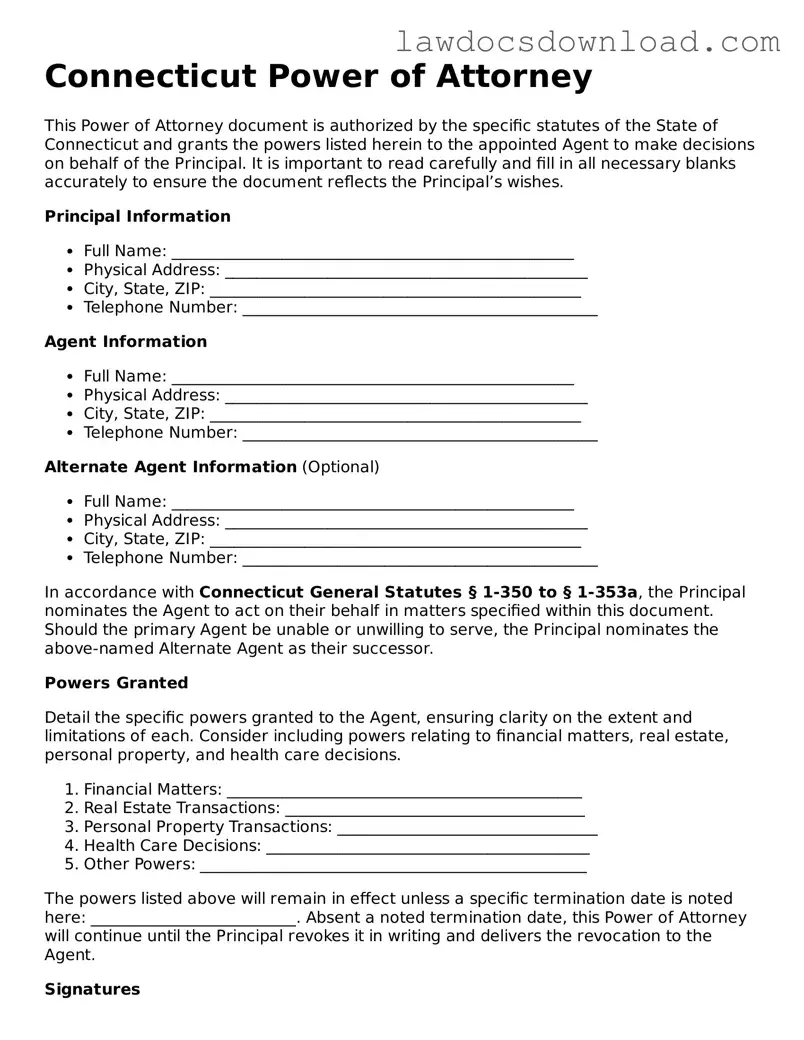Connecticut Power of Attorney
This Power of Attorney document is authorized by the specific statutes of the State of Connecticut and grants the powers listed herein to the appointed Agent to make decisions on behalf of the Principal. It is important to read carefully and fill in all necessary blanks accurately to ensure the document reflects the Principal’s wishes.
Principal Information
- Full Name: ___________________________________________________
- Physical Address: ______________________________________________
- City, State, ZIP: _______________________________________________
- Telephone Number: _____________________________________________
Agent Information
- Full Name: ___________________________________________________
- Physical Address: ______________________________________________
- City, State, ZIP: _______________________________________________
- Telephone Number: _____________________________________________
Alternate Agent Information (Optional)
- Full Name: ___________________________________________________
- Physical Address: ______________________________________________
- City, State, ZIP: _______________________________________________
- Telephone Number: _____________________________________________
In accordance with Connecticut General Statutes § 1-350 to § 1-353a, the Principal nominates the Agent to act on their behalf in matters specified within this document. Should the primary Agent be unable or unwilling to serve, the Principal nominates the above-named Alternate Agent as their successor.
Powers Granted
Detail the specific powers granted to the Agent, ensuring clarity on the extent and limitations of each. Consider including powers relating to financial matters, real estate, personal property, and health care decisions.
- Financial Matters: _____________________________________________
- Real Estate Transactions: ______________________________________
- Personal Property Transactions: _________________________________
- Health Care Decisions: _________________________________________
- Other Powers: _________________________________________________
The powers listed above will remain in effect unless a specific termination date is noted here: __________________________. Absent a noted termination date, this Power of Attorney will continue until the Principal revokes it in writing and delivers the revocation to the Agent.
Signatures
This document must be signed by the Principal in the presence of a Notary Public or two (2) adult witnesses who are not the named Agent or related to the Principal by blood, marriage, or adoption. The witnesses cannot be beneficiaries under this document or have a financial interest in the Principal’s estate.
Principal’s Signature: _____________________________________________ Date: _______________
Agent’s Signature: _______________________________________________ Date: _______________
Alternate Agent’s Signature (if applicable): __________________________ Date: _______________
Notary Acknowledgment
To be completed by a Notary Public:
This document was acknowledged before me on (date) ______________ by (name of Principal) _________________________________.
_____________________________________
(Seal) Notary Public
Witness Acknowledgement
Witness 1 Signature: _____________________________________________ Date: _______________
Print Name: _____________________________________________________
Witness 2 Signature: _____________________________________________ Date: _______________
Print Name: _____________________________________________________

